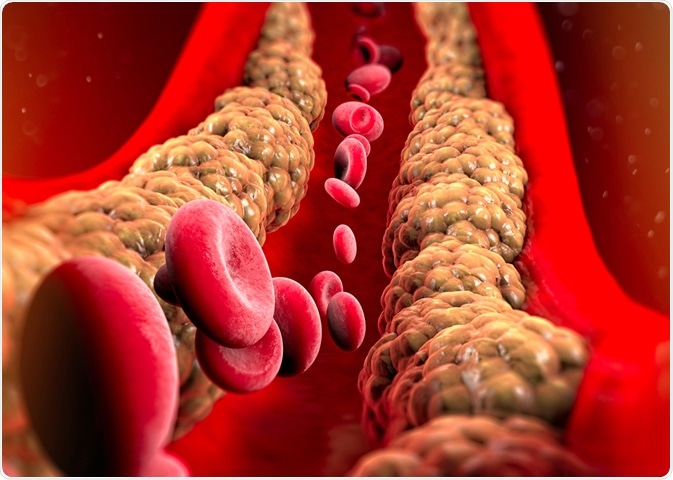When metabolized by the human body, triglycerides, which are a type of fat, are critical sources of energy. In fact, it is estimated that triglycerides contain double the amount of energy as compared to both carbohydrates or proteins that can also be used to supply energy to the body.
As a normal component of the vascular system, triglycerides are continuously being circulated in the event that they need to be metabolized to provide a source of energy. When present in excess, triglycerides can be stored in fatty deposits, which may lead to obesity and related health conditions if it extends over time.

Image Credit: Naeblys / Shutterstock.com
Triglyceride metabolism
The chemical structure of triglycerides is composed of a glycerol molecule that is bound to three fatty acid chains. These three fatty acid chains can vary for each molecule, thus creating many different types of triglycerides.
Through a process known as lipolysis, triglycerides are broken down to release the fatty acids from the monoacylglycerol in the intestine while simultaneously secreting lipases and bile. The triglycerides can then be reconstructed in the enterocytes to incorporate cholesterol and proteins to form chylomicrons. Chylomicrons then move into the lymphatic and vascular systems to be transported around the body as an energy supply.
It is the glycerol component of the triglyceride that is the most useful to the body in providing a source of energy, as it is easily converted into glucose, which can be used to supply the brain with energy. The fatty acids can also provide energy but must be converted to a ketone chemical structure in order to be utilized for this purpose.
As a complete molecule, triglycerides cannot be absorbed into the cells of the body from the bloodstream. Therefore, these compounds must be broken down into their separate components in order to be utilized.
Triglyceride storage
When there is an excess of triglycerides in the body, they can be stored in the liver or in fat cells to supply the body with energy when it is required. This is a natural process that provides a sustained source of energy for the body, particularly between meals, as triglycerides are a stored energy source.
The hormone glucagon is released when triglyceride stores need to be activated, which signals lipases to initiate the reaction and free the fatty acids. This allows the triglycerides to circulate in the bloodstream once again to provide energy to cells that require it.
Excess triglycerides
High levels of triglycerides, which is a condition referred to as hypertriglyceridemia, occur in many different populations in the world today and are strongly related to the quantity of fat consumed in the diet. This is because triglycerides are formed from foods that have a high-fat content and are then stored as excess in fatty deposits, linking it strongly to obesity.
As a result, high triglyceride levels are associated with an increased risk of serious health conditions such as cardiovascular disease. Accordingly, people who have high levels of triglycerides should be advised to reconsider their diet and any habits of overeating in order to lower their triglyceride levels and reduce their risk of these conditions.
Some individuals may also have high triglyceride levels due to other circumstances such as excessive alcohol consumption, uncontrolled diabetes, hormonal abnormalities kidney or liver disease, the use of certain medications, or as a result of a genetic disorder. If this is the case, the primary cause should be managed appropriately in order to manage the triglyceride levels.
References
Further Reading
Last Updated: Jun 18, 2023